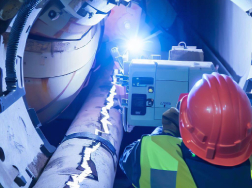Pipeline pigging services are vital for maintaining the efficiency and integrity of pipelines in industries like oil and gas, chemicals, and hygiene. Using specialized “pipeline pigs,” these services ensure thorough cleaning, inspection, and removal of residual products. This enhances pipeline performance, safety, and reliability.
Pipeline cleaning services are vital for maintaining the efficiency and integrity of your pipelines. With years of expertise in pigging pipeline services, Flowmore is your trusted partner in ensuring the smooth and uninterrupted flow of your valuable resources. Our cutting-edge pigging pipeline solutions are tailored to meet the unique demands of various industries, including oil and gas, chemicals, and hygiene sectors. Trust Flowmore to keep your operations running seamlessly and efficiently, protecting your assets and maximizing your productivity.
A pipeline pig, also known as a pipeline cleaning pig or simply pig, is a device used to provide industrial pipe cleaning services in the oil and gas industry to perform maintenance and inspection operations within pipelines. Despite its name, a pipeline pig has nothing to do with the animal; it gets its name from the squealing sound it makes while moving through the pipeline.
Overall, pipeline pigging services play a crucial role in maintaining the cleanliness and integrity of pipelines. They help prevent reduced performance, increased energy costs, corrosion, leaks, and cracks in the pipe, ensuring the safe and efficient transportation of products through the pipeline.
1
Embracing cutting-edge technology, we stay ahead of the curve to provide you with the most advanced pigging solutions. Our state-of-the-art equipment and innovative methodologies enable us to tackle even the most complex pipeline challenges.
2
We understand that every pipeline system is unique, and that’s why our team of experts works closely with you to develop customized pigging solutions. From initial assessment to ongoing maintenance, we prioritize your requirements to deliver exceptional results.
3
By employing our pigging services, you can optimize your pipeline efficiency, minimize downtime, and enhance overall operational performance. Our proven techniques remove debris, scale, and build-up, ensuring improved flow rates and reduced energy consumption.
4
We prioritize safety above all else. Our team follows industry best practices and adheres to stringent safety standards to safeguard your assets and protect the environment. Rest assured, your operations will be in capable hands.
There are various types of pipeline pigs available, each designed for specific tasks. Some common types include:

Cleaning pigs are used to remove debris, wax, and other substances that accumulate inside the pipeline. They are equipped with brushes, scrapers, or other cleaning elements to effectively clean the pipeline walls.

Gauging pigs are used to measure the internal dimensions of the pipeline. They help detect any abnormalities, such as dents or deformation, that could compromise the pipeline's structural integrity.

Inspection pigs are equipped with sensors and cameras to inspect the internal condition of the pipeline. They can detect corrosion, cracks, or other defects that may require repair or maintenance.

Utility pigs serve multiple purposes, including cleaning, gauging, and inspection. They are versatile tools that can be customized based on the specific requirements of the pipeline.
Utilizing advanced intelligent pigging technology, we inspect your pipelines with precision, providing accurate data on integrity, corrosion, and potential threats, helping you make informed decisions about maintenance and repairs.
Our expert technicians employ specialized pigging techniques to remove deposits, scale, and contaminants from your pipelines. By restoring optimal flow conditions, we help you maintain peak performance and extend the lifespan of your infrastructure.
We offer comprehensive pipeline maintenance programs tailored to your specific needs. From regular inspections to preventive maintenance strategies, our programs ensure the longevity and reliability of your pipeline systems.
Leverage our in-depth industry knowledge through our consultancy services. Our experts provide valuable insights, customized training, and strategic recommendations to enhance your pipeline operations and optimize resource utilization.
Pipeline pigs have various applications within the oil and gas industry. Some of the key applications include:

Pipeline pigs are used for cleaning pipelines and maintaining their operational efficiency. By removing debris, wax, and other contaminants, pipeline pigs help prevent blockages and maintain optimal flow rates.

Inspection pigs equipped with corrosion monitoring sensors play a crucial role in identifying areas of the pipeline that are prone to corrosion. This allows operators to take proactive measures to mitigate the corrosion and prevent further damage.

Pipeline pigs with advanced inspection capabilities, such as magnetic flux leakage (MFL) or ultrasonic testing (UT), are used to detect cracks or defects in the pipeline walls. Early detection helps prevent leaks and potential failures.

In multiproduct pipelines, where different types of products are transported simultaneously, pigs can be used to separate the products and prevent contamination or mixing.

Pigs are also utilized in hydrostatic testing of pipelines, where the pipeline is subjected to high-pressure water to test its strength and integrity. Pigs assist in ensuring that the pipeline is properly filled and pressurized during the testing process.
Pipeline pigs come in various sizes, ranging from a few inches to several feet in diameter. The size of the pig depends on the dimensions of the pipeline it is intended to operate within.
Yes, pipeline pigs can be used in both onshore and offshore pipelines. However, accessing the pipeline for pigging operations may require different techniques and equipment depending on the location.
The replacement frequency of pipeline pigs depends on several factors, including the type of pig, the condition of the pipeline, and the frequency of pigging operations. Regular inspection and maintenance help determine when a pig should be replaced.
While pipeline pigging itself is not inherently harmful to the environment, the disposal of pigging waste and the impact of pipeline operations on ecosystems are important considerations. Proper waste management and adherence to environmental regulations are necessary to mitigate potential risks.
Some advanced inspection pigs are equipped with sensors capable of detecting leaks in the pipeline. These sensors can identify changes in pressure, temperature, or other indicators of a potential leak, allowing operators to take necessary action promptly.